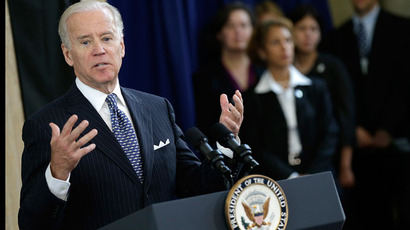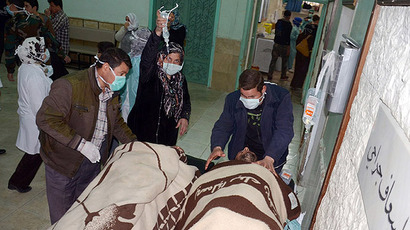Rebels film execution of 11 Syrian soldiers, as Obama continues anti-Assad rhetoric
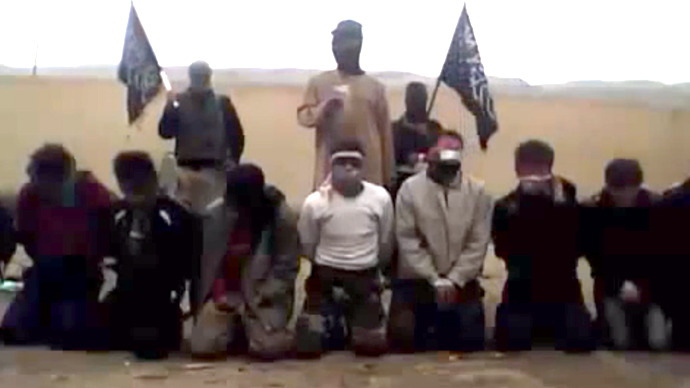
As a new video is published showing fighters of the Al Qaeda-linked Al-Nusra Front in Syria executing 11 men they say are Bashar Assad’s soldiers, Obama talks to Turkey’s Erdogan, renewing threats of action against the Syrian government.
The video, which was posted on YouTube on Thursday, is believed to have been filmed in the eastern Deir-al Zor province and appears to date from some time in 2012, according to the Syrian Observatory for Human Rights, a monitoring group with a network of activists in Syria.
The footage shows the commander, his face obscured in a black
balaclava, shooting each prisoner in the back of the head as they
kneel blindfolded lined up in the sand.
The Islamic militants shout “God is great” each time a
man is shot. In some cases the executioner comes back and fires
more bullets to make sure they are dead. The Al Nusra Front, which
is thought to be behind the footage, has links to Al-Qaeda, and
itself has ended up on America’s terrorism list in December
2012.
Rami Abderrahman, the head of the Observatory, told Reuters that
the Al Nusra Front has been releasing several videos of their
gruesome operations.
The Observatory said that such videos have become increasingly
common in Syria’s bloody civil war, which has now claimed 80,000
lives, according to latest UN estimates.
The Nusra video is the second to appear online in the last two days to show executions by fighters who claim links to al-Qaeda.
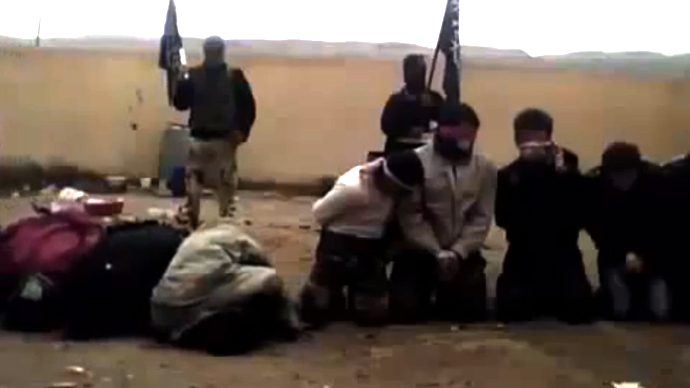
It comes after horrific footage was released on Sunday of a Syrian rebel commander apparently eating one of the lungs of a dead government fighter. Time magazine said they had first seen the footage in April and identified the man as Khaled al-Hamad. Hamad admitted to the magazine that he had mutilated the corpse of the soldier as an act of revenge for allegedly defiling a naked woman and her daughter.
The footage was swiftly condemned by the Syrian
opposition.
Nadim Houry of Human Rights Watch told the Guardian that it is “not enough for Syria’s opposition to condemn such behavior or blame it on violence by the government. The opposition forces need to act firmly to stop such abuses.”
But Hamad, who is also known as Abu Sakkar, has also received
support amongst the more hardline rebels in Syria. Sakkar’s
supporters often make portraits of him with the inscription “We
Love You”.
Obama repeats warnings of a ‘military option’
The controversy comes as a joint news conference with Turkish Prime
Minster, Tayyip Erdogan, and President Obama was held Thursday.
Obama said that the US reserves the right to resort to diplomatic
and military options if there is conclusive proof that Assad has
used chemical weapons.
"There are a whole range of options that the United States is already engaged in… And I reserve the options of taking additional steps, both diplomatic and military, because those chemical weapons inside of Syria also threaten our security over the long term as well as our allies and friends and neighbors."
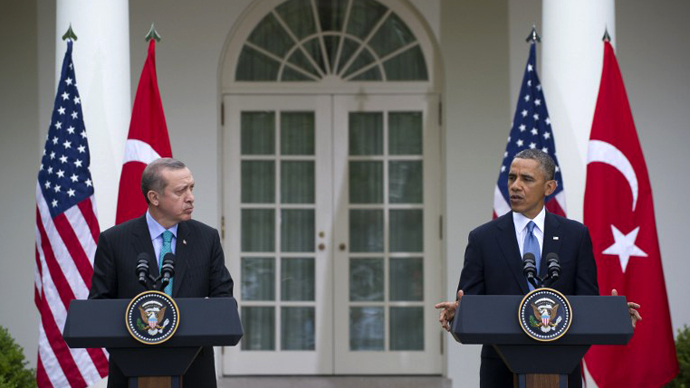
Erdogan, for his part, added that “ending this bloody process in Syria and meeting the legitimate demands of the people by establishing a new government are two areas where we are in full agreement with the US. We also agree that we have to prevent Syria from becoming an area for terrorist organizations. We also agree that chemical weapons should not be used.”
But Aleksandr Lukashevich, a spokesman for the Russian Foreign Ministry, said Monday that the accusation that the Syrian regime has used chemical weapons could be a sign that public opinion is being prepared for the possibility of military intervention in Syria.
“A lot of reasoning appeared in a number of Arab and other international mass media regarding the use of chemical weapons in the standoff between the government forces and the opposition guerrillas,” he warned.
Speaking to Lebanon's Al Mayadeen TV channel Russian Foreign Minister Sergey Lavrov said Moscow will make no “backstage” agreements on Syria in exchange for Western concessions on missile defense or any other disputed issues.
“This is not serious. I think that those who try suggest that
indulge in wishful thinking,” Lavrov said in an interview with
Lebanon's Al Mayadeen TV channel.
“Everyone knows well that Russia’s stance on a whole range of
crucial issues is not opportunistic,” the Russian top diplomat
emphasized.
On Wednesday, the UN passed resolution 6a, which has condemned Assad’s regime for re-escalating the Syrian conflict. The document was passed with a vote of 107 to 12, and with 59 abstaining.
The support was far lower than a resolution last august, which
condemned Assad for cracking down on dissent. The decline in
support is seen as a sign of growing unease at increasing extremism
among Syria’s fractious rebels.
Russia voted against this year’s resolution, saying it was "counterproductive and irresponsible" to promote a one-sided resolution when Moscow and Washington are trying to get the Syrian government and opposition to agree to negotiations.
At a meeting in Geneva last year the major world powers reached
a degree of consent between the positions of Russia and the West
who do not often see eye to eye on Syria. They agreed that any
future government in Syria could include members of the current
regime as well as opposition groups. There was also no specific
demand that Assad must step down – something the West has insisted
on – and instead an agreement pushed by Russia and China that the
future makeup of any Syrian government would be decided by the
Syrian people. A follow-up meeting on the conference has been
agreed by Lavrov and US State Secretary John Kerry; it is reported
to be preliminary scheduled for June.













